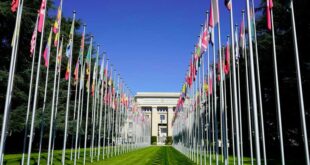Darya Lyubinskaya
Future of Turkish Stream pipeline at risk over question of Balkan participation
In an article titled “Brother’s betrayal,” the business magazine Expert reports that the West has dealt another blow to Russia’s Turkish Stream gas pipeline project: Serbia will join the Trans Adriatic Pipeline (TAP).
The publication explains that 75 percent of Serbia’s gas supply consists of Russian gas, which comes via Ukraine. However, Gazprom has clearly stated that it plans to abolish this transit route in favor of Turkish Stream. Since Turkish Stream does not exist yet, Belgrade must insure itself.
“Moreover, since it intends to join the European Union and as a member of the EU Energy Community, Serbia is obliged to implement the regulations of the Third Energy Package on the diversification of energy import sources,” says Co-Chairman of the Kiev Energy Strategy Foundation Dmitry Marunich.
However, the issue is not about diversification: The Serbs still have not decided if they will participate in Turkish Stream. Expert magazine says that this should motivate Moscow to draw two conclusions. Firstly, it should finally understand that it does not have any “brotherly” relations with either Balkan or non-Balkan countries. Secondly, the situation with Serbia has demonstrated the difficulties of realizing the Turkish Stream project in the light of the opposition from the EU Commission.
The EU does not even need to pressure Turkey and force Ankara to stop cooperating with Russia, since Macedonia, Serbia or Bulgaria’s refusal and the impossibility of laying the stream through Albania makes the realization of the project through South-western Europe impossible, explains Expert magazine.
Yet, it is still too early to bury the project: In the event of Serbia and Macedonia’s rejection of Turkish Stream, Gazprom has another itinerary via which it can supply gas to its final destination – through Greece and Italy.
Final signing of nuclear deal with Iran under threat
The centrist newspaper Nezavisimaya Gazeta reports that the nuclear talks between the P5+1 group of six major powers (the U.S., Russia, China, the UK, and France, plus Germany) and Iran have recommenced in Vienna. The publication remarks that diplomats believe it will not be very possible to conclude a final agreement by the end of June since it is unlikely that accord on all aspects will be reached. Neither Washington nor Tehran are showing much optimism, writes the newspaper.
The main positions have not changed: Tehran’s emissaries are insisting on an immediate cancelation of the Western sanctions currently in place against the regime, while western countries believe this should be a gradual process. Nevertheless, the world press has obtained information that Iran is preparing for the worst-case scenario. According to Tehran’s opposition, the National Council of Resistance of Iran, North Korean ballistic missile and nuclear warheads experts visited the Islamic Republic in April. Council representative Shakhin Gobadi announced that Tehran does not intend to renounce its plans to develop nuclear weapons.
“I am optimistic about the deal,” said Vladimir Sazhin, a senior scientific collaborator at the Institute of Middle East Studies at the Russian Academy of Sciences. “Both Washington and Tehran are interested in resolving the conflict and removing the sanctions.”
Sazhin believes that success in implementing the agreements on Iran’s nuclear program signed in Geneva in 2013 and concluding the deal reached in Lausanne in April 2015 bears witness to the fact that the final, most complicated agreement will eventually be signed, even if it happens after June 30.
Regarding the visit of North Korean specialists, Sazhin remarked that the two countries have had very good relations for a long time and many Iranian missiles are copies of North Korean ones. Sazhin is in no doubt that missile and nuclear technology experts from both countries are collaborating.
FIFA investigation is U.S. attempt ‘to manipulate’ soccer organization
The Gazeta.ru online newspaper writes that the major American investigation into corrupt FIFA officials is unlikely to result in the cancelation of the next World Cup, which is to be held in Russia in 2018. The publication writes that 14 FIFA officials have been charged on 49 criminal accounts, including bribery and racketeering. Seven of them were arrested by the Swiss police in Zurich at the request of the U.S.
Since the arrests occurred on the eve of today’s FIFA presidential elections and deal a serious blow to the reputation of the organization’s president, Joseph “Sepp” Blatter, it can be concluded that the U.S. is trying to manipulate and pressure the international soccer organization, writes the newspaper.
Blatter’s only competitor for the post is one of the King of Jordan’s sons, Prince Ali bin Hussein, writes the newspaper (in fact, three new candidates have entered the race in the wake of the scandal – RBTH). According to Middle East expert Theodore Karasik, Prince Ali is considered a pro-American figure and in Washington he is regarded as a fighter against corruption.
“Most likely the corruption accusations will be brought to the end,” says Karasik, adding that Ali’s main objective could have been the “cleansing of FIFA.” Meanwhile, Americanologist and political analyst Areg Galstyan says that the scandal has been “brewing for a while” and now the Americans “have finally gathered the necessary proof to do some purging.”
 Geostrategic Media Political Commentary, Analysis, Security, Defense
Geostrategic Media Political Commentary, Analysis, Security, Defense





